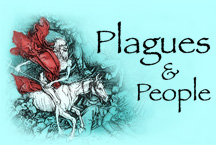
Infectious and Epidemic Disease in History
Department of History
University of California, Irvine
Instructor: Dr. Barbara J. Becker

Department of History
University of California, Irvine
Instructor: Dr. Barbara J. Becker
Years, BP |
|
world population |
|
|
|
(~San Jose, 2010) |
|
|
|
(~Singapore, 2010) |
|
|
|
(~Hong Kong, 2010) |
|
|
|
(~Pakistan, 2010) |
|
|
|
(~US, 2010) |
|
|
|
(~China +US, 2010) |
|
|
|
|
As long as a microbe can infect more than one new host, disease will spread even if original host dies:
|
| Methods of microbe transmission:
Passive--
Active--
|
|
||||
Over time, natural selection has favored the following physiological responses to disease:
|
| How have humans responded socially, emotionally, intellectually to disease? |
Disease viewed as consequence of supernatural intervention in human affairs |
|
attributed to Moses (ca. 1450 BCE) Chapter 1 Satan replied, Do you think Job fears you for nothing? Haven't you protected him and his household, and blessed his work so that he has prospered? Take all this away from him and he will curse you to your face! The Lord said, Very well, then, everything he has is in your hands. Do what mischief you will, only spare his life.... And Satan smote Job with sore boils from the sole of his foot to the top his head.... |
[Job's] wife said to him, "Are you still holding on to your integrity? Curse God and die! (Benedic deo, et morere.)" |
|
attributed to Homer (ca. 550 BCE) Book I ... And which of the gods was it that set [Achilles and Agamemnon] on
to quarrel? It was [Apollo]; for he was angry with the king and sent
a pestilence upon the host to plague the people, because [Agamemnon] had
dishonored Chryses his priest....
|
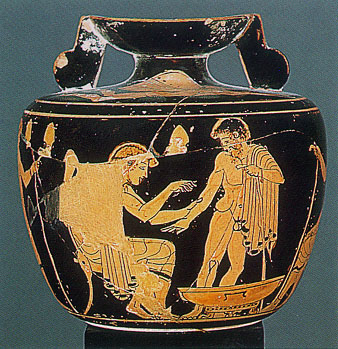 |
ca. 470 BCE Physician prepares to "bleed" his patient |
Aesclepius, son of Apollo, practices the art of healing and teaches his disciples the cures established by his father. |
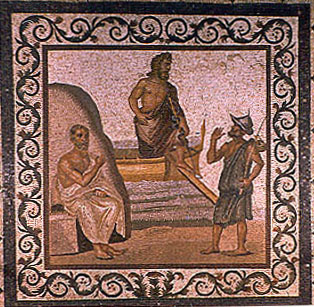 |
Disease viewed as product of natural forces |
|
The Ionians
Ionia, 5th and 4th c. BCE |
|
| To account for | which the Greeks called... | |
| stability in the world... | find what is fundamental, constant and unchanging... |
|
| diversity in the world... | find what is different, what changes, and how it changes; this will reveal the rules or agencies that control the change process... |
|
| pattern in the world... | use these rules to organize the fundamentals into a "neat array"... |
|
________________ |
||
Empedocles (490-430 BCE) |
||
| Agents of love and strife (attraction and repulsion) act on 4 elements
(earth, air, fire, water) to produce diversity observed in the world.
We can know about the world because we are made of these elements. Tension and balance generated by opposing qualities (wet vs. dry; cold vs. warm) is behind all change observed in terrestrial world. |
||
The Four Elements
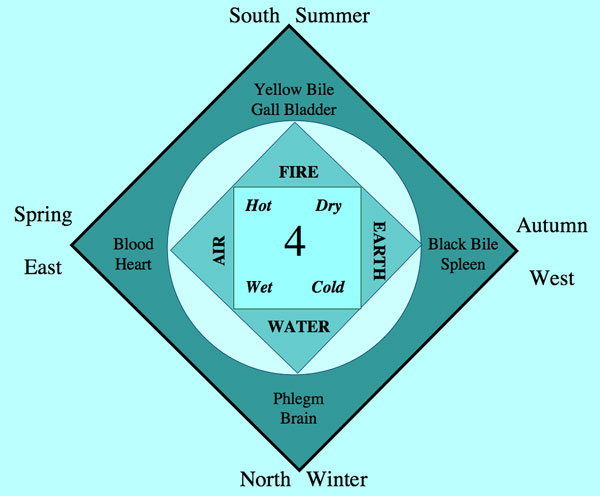
In the human body, the four elements constitute the four fluids:
Disease results when the fluids are out of balance. To restore health, actions must be taken to the balance must also be restored--
|
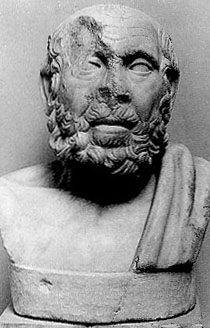
|
(460-377 BCE??) marked a transition from mythological conjecture to rational explanation applied Ionian principles to medical practice accounted for causes and symptoms in purely natural terms treatises display an entirely rational outlook towards disease |
Works attributed to Hippocrates:
|
|
|
On Airs, Waters, and Places (c. 400 BCE) by Hippocrates Whoever wishes to investigate medicine properly, should proceed thus--
And in particular, as the season and the year advances, he can tell what epidemic diseases [diseases that are not always present in the population] will attack the city, either in summer or in winter, and what each individual will be in danger of experiencing from the change in routine. |
Two Early Recorded Epidemics |
|
|
 |
| Go to: |
|
|